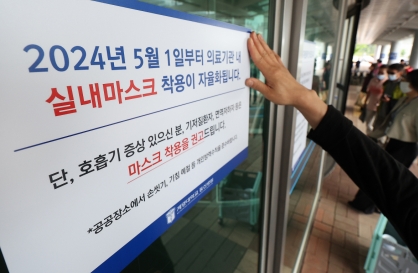Newcomers to Korea’s tax-free market in all-out war
Highlighting lavish display, powerful images of Korea’s top celebrities, new duty-free operators in fierce race to attract Chinese, break Lotte’s dominance
By Korea HeraldPublished : June 9, 2016 - 16:05
[THE INVESTOR] Step into the doors of the third-floor entrance of HDC Shilla Duty Free in Yongsan, central Seoul, and it’s a whole new world.
The gleaming marble floors, the endless showcases stamped with global cosmetics brand names and the air filled with a faint floral scent are in stark contrast to the surrounding area, known best for its American military base.
The gleaming marble floors, the endless showcases stamped with global cosmetics brand names and the air filled with a faint floral scent are in stark contrast to the surrounding area, known best for its American military base.

But it’s the sounds that separate the outlet most from its neighboring structures -- the sounds of spoken Mandarin.
“My wife told me to go straight to Sulwhasoo,” said a 47-year-old James Chen, who said he was visiting from Beijing.
He and other shoppers, crowded around the display cases, many of them murmuring into their phones on voice messaging apps to consult with friends or family back in China about what products to buy. There’s scarcely a word of Korean to be heard.
Chen is one of thousands of foreign tourists visiting newly opened duty-free stores in Seoul, where shopping is tailored for Chinese tourists looking to score big on Korean cosmetics and other luxury items.
“We get up to 5,000 visitors a day, mostly with large tourist groups,” said HDC Shilla marketing manager Youm Chang-seon. All of the employees here speak fluent Chinese, he confirmed.
Shoppers walk into the outlet dozens at a time, unloading from a bus parking lot just outside.
Once inside, they all make a beeline for the far inside corner of the floor where Korean brands Sulwhasoo and Whoo have their wares on display.
Spacious and clean, the mall is nothing like the crowded duty-free stores found in airports. Luxury boutiques lined up one after another, the mall opened in March offers exquisite shopping experience resemble to one of high-end department stores in Seoul.
HDC Shilla, a 50:50 joint venture between Hotel Shilla, a hotel unit of Samsung Group, and Hyundai Development, a local builder, is one of five operators that won new licenses to operate duty-free outlets in Seoul after intense competition last year.
HDC Shilla is not the only one making dire efforts to attract Chinese visitors.
All five operators have been aggressively competing with each other even after a tough bidding race last year.
By making massive investments in interior design and hiring Korea’s top celebrities for advertisement and image making, operators are in all-out war to win in the world’s largest tax-free retail market that has been dominated by Lotte for a long time. Korea is the No. 1 duty-free market in the world, with annual sales of 9.2 trillion won ($7.96 billion) last year. Lotte takes about 50 percent of market share, followed by Hotel Shilla by 28 percent, according to industry insiders.
Last year’s new licenses marked the first increase in the number of duty-free permits in 15 years.
But the government plans to grant four more licenses at the end of this year. There will be thirteen duty-free malls in Seoul alone once the additional four outlets begin operations next year.
The moves are seen as capitalizing on a rare bright spot in Korea’s lackluster economy. Before the Middle East respiratory syndrome took a toll on tourism last year, the duty-free industry had been growing at a rate of 20 percent annually, according to the Korea Duty Free Association.
But new duty-free operators are casting concerns, saying that having more operators would only instigate excessive rivalry in the already saturated market.
They are also waging a fierce battle to house global luxury brands like LVMH Moet-Hennessy Louis Vuitton, Hermes and Chanel.
The operation of LVMH’s luxury brands is crucial for Korean duty-free businesses, as they are key to attracting high-end, big spenders at home and abroad.
So far, only HDC Shilla has secured a deal with LVMH to house their brands. The remaining four newly licensed duty-free stores have yet to secure participation from LVMH.
“The key to take the lead in the market is to house LVMH, Chanel or Hermes at stores within two years from the opening. Without having one of the brands, it would be difficult to run business,” said an industry insider.
Still, the intense competition raises questions about sustainability due to the market‘s high dependence on Chinese tourists.
For HDC Shilla, for instance, about 70 percent of all sales come from tourists from China, Youm said.
For now, duty-free outlets seem to have embraced the fact that appealing to Chinese fans of K-pop is the industry’s key sales factor.
The trend is clear in the brands’ choice of spokesmodels. Doota Duty Free has hired Song Joong-ki, the lead actor in the recent megahit Chinese-Korean drama series “Descendants of the Sun,” while HDC Shilla has picked up leading lady Song Hye-kyo.
Hanwha Galleria has said that it has brought in actor Song Seung-heon, who will be starring in the upcoming TV drama “Saimdang, The Herstory” to be aired simultaneously in Korea and China. SM Duty Free has even created a separate zone for products related to hallyu drama content.
“For now, K-pop is a big factor that wins the heart of Chinese visitors. But what if it does not last forever?” posed an industry watcher.
By Cho Chung-un (christory@heraldcorp.com) and Won Ho-jung (hjwon@heraldcorp.com)
-
Articles by Korea Herald




![[Music in drama] Rekindle a love that slipped through your fingers](http://res.heraldm.com/phpwas/restmb_idxmake.php?idx=644&simg=/content/image/2024/05/01/20240501050484_0.jpg&u=20240501151646)

![[New faces of Assembly] Architect behind ‘audacious initiative’ believes in denuclearized North Korea](http://res.heraldm.com/phpwas/restmb_idxmake.php?idx=644&simg=/content/image/2024/05/01/20240501050627_0.jpg&u=20240502093000)



![[KH Explains] Will alternative trading platform shake up Korean stock market?](http://res.heraldm.com/phpwas/restmb_idxmake.php?idx=644&simg=/content/image/2024/05/01/20240501050557_0.jpg&u=20240501161906)








![[Today’s K-pop] Stray Kids go gold in US with ‘Maniac’](http://res.heraldm.com/phpwas/restmb_idxmake.php?idx=642&simg=/content/image/2024/05/02/20240502050771_0.jpg&u=)